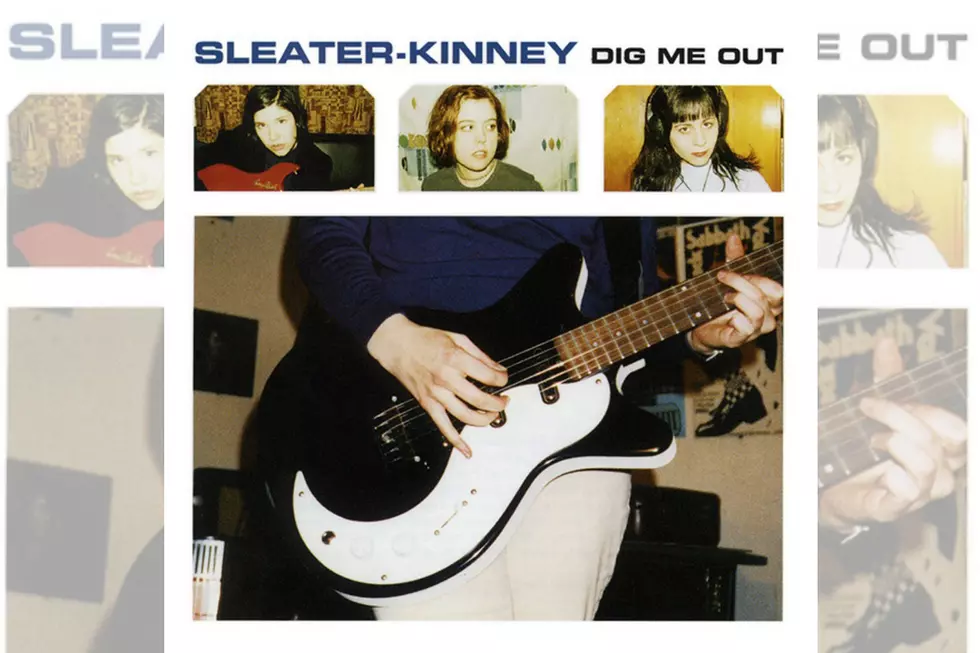
20 Years Ago: Sleater-Kinney Make Their First Major Statement With ‘Call the Doctor’
There were plenty of punk rock records released in 1996. In fact, there was a virtual glut. Propagandhi put out the best album of their career, Bad Religion, NOFX and even the Descendents chugged along, and Discount issued their neck-snapping debut. But an album from a band out of Olympia, Wash. that was sparked from the dying embers of the riot grrrl scene, was the most innovative, brual, powerful, and hell, maybe even the punkest punk record to come out that year.
Corin Tucker was 23 and Carrie Brownstein was 21 when their band, Sleater-Kinney, recorded Call the Doctor with drummer Lora Macfarlane, but they’d already been fixtures of the countercultural, zine-driven riot grrl movement for years. Both singers and guitarists, Tucker had been in a band called Heavens to Betsy while Brownstein was in Excuse 17. The bands were respected within the scene, but if not for Sleater-Kinney, Tucker and Brownstein might never have become more than Wikipedia footnotes.
They transcended the insular scene mostly because Call the Doctor transcended anything that could fall under a label as politically, personally and sonically limiting as riot grrrl – despite the significance and influence of the movement. Especially by the late ‘90s, riot grrl had gone from a badge of honor to a kind of broad misnomer — Sleater-Kinney, at least in their early years, were quickly lumped in with bands like Hole and the Breeders. And though they shared a gender and an affinity for loud guitars with those bands, they didn't have the same ideologies. Even without its mutating meaning, riot grrrl was about a specific time and a place. It was an exchange of ideas that was thoroughly meaningful but also ripe for co-opting by major labels (and, in turn, for transforming into something more prepackaged and altogether less meaningful). But this didn't apply to Call the Doctor, a sheer work of art that rose above it all.
First and foremost, the album rewrote the rules of what punk bands could do. The way the Clash copped ska rhythms without losing their sense of urgency, or how Dead Kennedys discovered punk’s latent capacity for maniacal humor, Sleater-Kinney saw new possibilities within the genre's DNA. They’d made one earlier album, 1995’s Sleater-Kinney, but Call the Doctor was where they honed their bilateral attack – it's a sound that interweaved Tucker and Brownstein’s voices and guitars into a communal entity. Where their voices pushed and pulled, emulating the everyday confusion of our deafening culture, their guitars created a roaring, rumbling backbone.
Rock songs are (practically by definition) typically a vocal line complemented by the rhythm and harmony of guitar, bass and drums. Sleater-Kineny created a sound with this album that was more like a circle: ideas and sounds sometimes clashed and sometimes coalesced. In interviews after the release of Call the Doctor, Tucker conceded that the band might bring on a bassist to “beef up” their sound. Thankfully, she never did; it's the spare interplay between Tucker and Brownstein is part of what defines their style.
To think of Call the Doctor as a purely political album is to sell short its capacity for introspection. It’s an album about what it’s like to be in a band, growing up and making a life for yourself. But the album is political — it just happens to be so with humor, a life-or-death insistence and high personal stakes. It’s just not political in the kind of sloganeering fashion that’s so easy accessible for punk bands. Instead, it vacillates between existential rage and acidic sarcasm. The title, for instance, seems to refer to the constant threat of abortion becoming illegal, a future in which even the doctor holds more sovereignty over women’s bodies than they do.
Sleater-Kinney look inward on Call the Doctor as often as they looks outward. On “Good Things,” for instance, Tucker (who spends much of the album talking about societal breakdown) sings: "Some things you lose, some things you give away.” There's a similar feeling of self-reckoning on “Anonymous," a song about how men often make women complicit in their own silence.
The sheer power in the band’s pared-down approach boils over in the album's powder keg, “I’m Not Waiting. Tucker and Brownstein’s guitars undergird lyrics about their demand to be valued as full-fledged human beings. Tucker hollers, "Honey baby sweetness darling I'm your little girl" as if they’re the last words she’ll ever sing. It’s as uncompromising and powerful as any punk song ever written and recorded. But “I’m Your Joey Ramone” is their best moment here, and one of the greatest in their prolific career. The conceit is that Brownstein imagines being idolized by punk kids the way the kids idolize Joey Ramone — the way idols are consumed and worshipped, all with a kind of voracity that tends toward boredom. “I’m the queen of rock and roll,” Tucker shouts, as Brownstein screams out the “Yeah!" in the background, almost mockingly. The best part about the moment is you couldn’t find a soul who’d object.
Time, of course, has shown that the band’s earliest efforts not only outlasted the riot grrrl moment, but that the band had enough thrust to make six more great records – and hopefully more. Macfarlane took off back to Australia after the album was done (her visa apparently ran out) and, after brief stints with other drummers, Janet Weiss was brought in to solidify the lineup. Her drumming was, in some ways, the missing piece.
Sleater-Kinney's next album, 1997's Dig Me Out, bests Call the Doctor only because Weiss whips the duo's maelstrom attack into even better shape. And that's largely the story of the rest of the band's career, which seemed to come to an end in 2006. But last year, they reassembled and released No Cities to Love, proving they're as good as they ever were as they continue to explore and refine the ideas they laid out so viscerally 20 years earlier. Call the Doctor is the first definitive statement from a band who repeatedly showed themselves capable of making both punk rock and feminism real and urgent to at least two generations. Their truth didn't die with the movement that birthed them. Instead, they armored their message with art.
20 Albums You Won't Believe Turn 20 in 2016
More From Diffuser.fm









